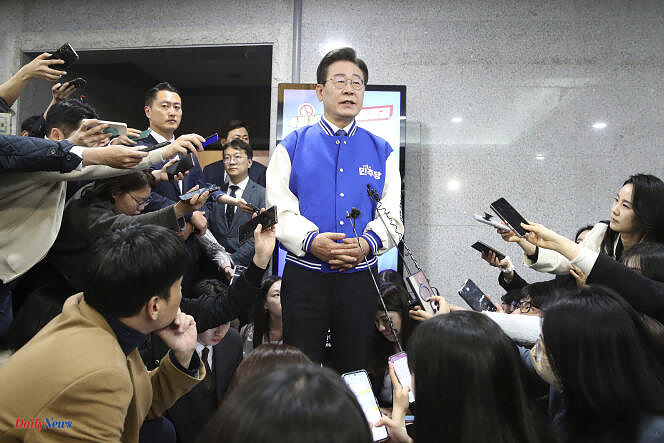Hard blow confirmed for Yoon Suk Yeol, the conservative president of South Korea: according to almost complete results, the main opposition party won in the legislative elections, reported Thursday, April 11, the Yonhap agency. The Democratic Party (center left) of Lee Jae-myung obtained 161 seats, 176 including those allocated by proportional representation, out of the 300 in the National Assembly. The candidate, seriously injured three months ago in a knife attack, and his allies would therefore not obtain 200 seats hoped for at one point, but would nevertheless do better than during the previous legislature (156).
For its part, Mr. Yoon's People Power Party (PPP) won only 90 seats directly, and is expected to obtain 109 with its satellite party. This result, pending official validation, puts the South Korean president in a very bad position for the remaining three years of his mandate. His party, however, appears able to retain enough seats to avoid an opposition-led qualified majority, which could have paved the way for his dismissal.
One party seems to have nibbled away at the two major parties, Rebuilding Korea, founded a few weeks ago by former Minister of Justice Cho Kuk, targeted by accusations of corruption which he denies. He took advantage of voter discontent with the two main parties to obtain between 12 and 14 seats, according to forecasts. “The people have won, the desire to try Yoon Suk Yeol is very clear,” Mr. Cho said after the vote, local media reported.
A popularity rating that never took off
Narrowly elected to the presidency against Lee Jae-myung in 2022, Yoon Suk Yeol has pursued a firm policy towards North Korea while strengthening his country's alliance with the United States and bringing it closer to Japan, a former colonial power with which there are numerous historical quarrels. But the lack of a parliamentary majority has already prevented him from implementing his right-wing program, and since the start of his presidency, his popularity rating has never taken off, often remaining around 30%.
Lee Jae-myung, mired in a series of corruption investigations that he considers motivated by political considerations, can now savor his revenge, obtained at the end of an ultra-polarized and hateful electoral campaign. The result of the election puts him in a good position to try his luck again in the 2027 presidential election, as everyone believes he intends to do.
“I will look at the people's choice with a humble heart,” Mr Lee said after the vote, as quoted by local media.
A discouraged youth
At the National Assembly in Seoul, where lawmakers and other officials gathered Wednesday for election night, the mood was somber in the PPP ranks, while shouts of joy and applause rang out from the Democrats.
However, demographics worked in favor of Mr. Yoon, voters aged over sixty, considered more conservative, being more numerous than those in their twenties or thirties. The latter say they are largely discouraged by a political class dominated by elderly men who ignore their concerns such as the cost of housing or job insecurity.
The tone of the campaign also turned off many voters. Substantive political debate has been nonexistent, replaced by calls to “jail” Mr. Lee or “punish” Mr. Yoon, hate speech and online misinformation that experts fear could lead to more attacks physical attacks like the one Mr. Lee suffered in January.












